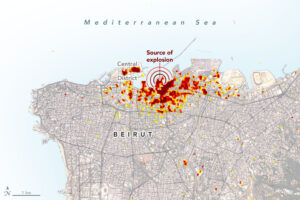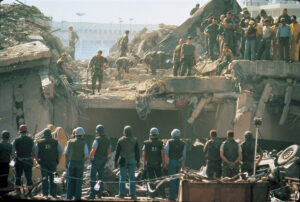I had limited knowledge of the history of the Middle East, especially before taking this course. Before attending the Clark Forum, “The Beirut Barracks Bombing of 1983,” I knew nothing about this event that ties in so closely to our course content.
The presentation started with a background of the political and social circumstances that existed in Lebanon in the late 1900s. This information was critical to understanding what led up to the Beirut bombing, as it provided an examination of what was happening at the state-level.
Lebanon had a diverse religious population consisting of Muslims, Jews, and Christians. Additionally, Lebanon contained the Palestine Liberation Army, a group that fought against Israelis near the border. A Civil War erupted in 1975, when Maronite Christians shot at Palestinian Muslims, and conflict broke out.
Understanding this conflict requires a state-level and system-level analysis of Lebanon’s history. Lebanon existed under a French mandate after the Sykes-Picot Agreement. Additionally, the Balfour Declaration named Jerusalem a national homeland for Jewish people. Both of these agreements sparked tensions that existed in Lebanon during the time of the bombings. We cannot understand the presence of US marines in Iraq without first learning about what led to this conflict.
President Bush sent 1,500 US troops to Beirut in 1982 to train the Lebanese army to fight against internal threats, despite domestic hesitance in the US. After nearly two years of occupation, a car bomb exploded in the US embassy, killing 60 US workers and marines. This attack changed the dynamic in Beirut and had a profound impact on US history.
The speakers at the Clark Forum talked about memorializing the victims of the bombing. I think that it is extremely important to understand the factors that led up to this attack to fully understand why US marines were in Beirut in the first place. A state-level analysis is critical to understanding the political and social climate of Lebanon at the start of US deployment. It is difficult for ordinary US citizens to commemorate these marines if they don’t understand these circumstances. Learning about the Beirut Barracks Bombing in this course is an important way to start memorializing the marines.



Leave a Reply